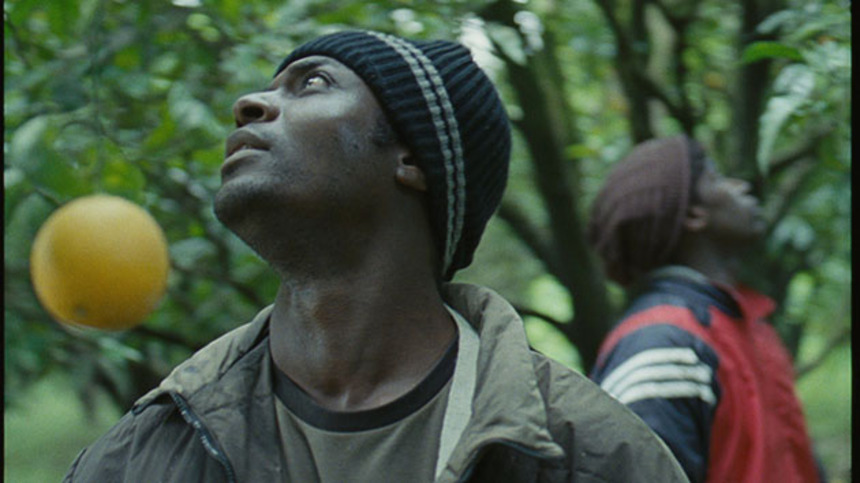Cannes 2015 Review: MEDITERRANEA, A Humanist Masterclass On Society's Forgotten Few

At one point in the film, a middle class family sits down to dinner and the father asks the television playing the news, dimly lit in the background, be turned off. "Just talk of pleasant things", is all he asks. Director Jonas Carpignano might have been moved to include that scene as counterbalance, as a recognition of one of challenges his film will confront. Mediterranea is precisely about not looking away.
By the time the story begins, our two leads have long been on the move. Ayiva (Koudous Seihon) and Abas (Alassane Sy) are best friends from Burkina Faso, having since left their native country for Tunisia with the plan to work and send money back. But the odd jobs and shady bosses they encounter makes them realize that to stay in Tunisia is to never get ahead, and so they set off for Libya, where they will board a boat of migrants heading for Italy.
Here is where the film's title comes into play. The word mediterranea is in the plural case, as to say, 'several mediterraneans', which is exactly what Carpignano wants us to understand. There is the Mediterranean of crystal water and leisurely breezes, of which this very Cannes film festival stands a particularly luxurious representative example, and then there is the Mediterranean of treachery and grime, the Mediterranean of Ayiva and Abas and their fellow migrants. Their journey through it is a harrowing one -- bandits, price gougers and tempestuous storms together ensure that fewer and fewer of the many who set out will ever make it to their final destination.
Carpignano shoots one midnight storm with chaotic precision. Flashes of violent light pierce the pitch-black night, revealing bodies flung from the small boat ferrying them across water, and then the debris of the boat itself, soaring through the air and crashing back into the water. One cannot watch such a sequence, where the herd of travellers is winnowed considerably, and not think of the recent tragedies off the Libyan coast (i.e., in precisely the same place) that left several hundred people dead.
For our Ayiva and Abas, theirs is a different fate. Among the lucky few to actually reach their stated destination, they (and, of course, we) quickly see that not as a resolution, but an introduction into a whole new crap situation. And the situation for them really can only be described as crap. Washing up in Southern Italy with little of the language and even less official documentation, they are unable to real employment or a proper roof for their heads. Instead they take quarters in a shantytown off the highway, dress themselves in stolen clothes and earn a couple Euros picking fruit during a seasonal orange harvest.
To make matters worse, Ayiva, Abas, and their fellow migrants exist at the very bottom of the downtrodden Campanian social ladder. They are harassed by the police, bullied by small children and involved in escalating conflict with a gang of local rabble-rousers. In short, they are officially invisible, engaged with only as targets. But for all their hardships, neither man devolves into bitterness.
For that matter, neither does the film.
Carpignano lays out out all the myriad difficulties of a very real social class, but does so through the eyes of two resilient, pragmatic protagonists. The film never devolves into hand-wringing poverty porn entirely through its focus on nuanced characterisation. One particular moment stands out above others. After a long days work, the migrants gather for some drinks at someone's home. There's beers and laughs, all relayed by the director's roving, handheld camera. Carpignano gets in close, whipping and panning in tight close-ups and the entire event seems like a huge, raucous blast. Not until the end of the scene does he cut to a wide-shot, and we realize the entire action has been between five people sitting in a dingy room the size of a broom closet.
In this moment we hear the film's voice loud and clear. We may have heard similar stories in the news. Somebody like this may have tried to sell you a chintzy Eiffel Tower in Paris. May you averted your gaze from them in Rome. You may think you know their tale, but think twice. Look again. Look closer.
Mediterranea
Director(s)
- Jonas Carpignano
Writer(s)
- Jonas Carpignano
Cast
- Koudous Seihon
- Alassane Sy
- Paolo Sciarretta
- Pomodoro

Do you feel this content is inappropriate or infringes upon your rights? Click here to report it, or see our DMCA policy.






